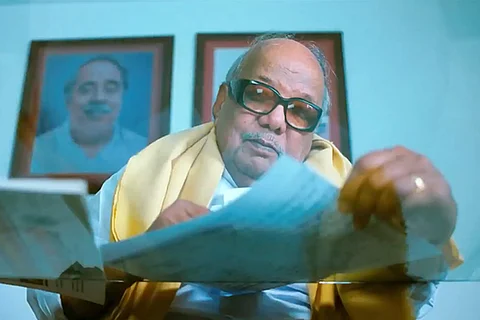

Kalaignar Muthuvel Karunanidhi has served as Chief Minister of Tamil Nadu for 18 years under multiple tenures. He is also the only Indian Chief Minister to have held the post at different occasions, spanning 6 decades, beginning in 1969.
But, in addition to being a great politician, Karunanidhi was also a poet, playwright and screenwriter and is known for his immense contribution to Tamil literature.
Even before Karunanidhi began writing stories, dialogues and scripts for films, he was a well-known playwright in the state. His plays were known for their sharp wit, clever narrative, strong political ideologies and powerful dialogues. Even while Karunanidhi was active in Periyar’s Dravidar Kazhagam, he continued writing and staging plays, sometimes acting a part or two himself.
Karunanidhi wrote and staged his first play in 1940 titled Palaniappan in his hometown Thiruvarur. This play was written and staged for the Tamil Nadu Tamil Student’s Union fund and had cost him Rs 200. In one of his essays Karunanidhi writes, “We collected Rs 80. Heavy rains on that day had serious effects, affecting collection.”
Fortunately, Nagai Dravidian Artistes Federation bought the play for Rs 100 and Karunanidhi’s Palaniappan was staged under the name Shantha and later as Nachukoppai that was staged even during the late 80s.
The popular classic Manthiri Kumari (1950) starring MGR in the lead was actually based on Karunanidhi’s play of the same name (written and staged in the early 1940s). Based on an incident from the Tamil literary classic Kundalakesi, this play was written for Devi Theatre Group and was first staged in Thiruvarur and later in Kudanthai. Produced by TR Sundaram of Modern Theatres, Manthiri Kumari the film was doyen Ellis R Dungan’s last Tamil feature.
In 1946 came the controversial play Thooku Medai. Karunanidhi had written this play specifically for MR Radha’s troupe and went on to play the role of Pandian himself. Having watched this play, MR Radha conferred the title ‘Kalaignar’ upon him. The moniker stayed.
For its stirring dialogues and powerful narrative that laid bare the inequalities in the society, Thooku Medai quickly came under the government’s radar - independent India’s government. The performance of this play was prohibited in free India by the government in GO No. 1193, dated 25 April, 1959.
A Madras High Court judgement delivered by J Sadasivam has the following passage about the play: “GO Exhibit P-8 shows that the drama Thooku Medai has been prohibited as an objectionable play on the ground that it deliberately intended to outrage the religious feelings of a class of citizens of India and also on the ground that it is indecent, scurrilous and obscene.”
This judgement was delivered in response to a case filed against MR Radha in 1962 stating that he had staged a play Kadhal Bali that had a strong resemblance to Karunanidhi’s Thooku Medai. MR Radha is known to have had a reputation for staging banned plays by restructuring them with a few modifications. One example is his 1946 drama Por Vaal that was later staged under different names - Sarvadhikari and Mahatma Thondan.
Yet, this play was Karunanidhi’s most prominent creation and had a great run, fetching them a profit of Rs 800 during one show in Tiruchy.
Karunanidhi went on write scripts and dialogues for several Tamil films. Yet, he never gave up on penning plays. Having watched Manthiri Kumari, NS Krishnan approached Karunanidhi to write the screenplay and dialogues for his film Manamagal (1952).
It was during this point that Karunanidhi moved to Chennai from Salem following NS Krishnan’s repeated requests.
Soon after his move, Karunanidhi began working on Mani Magudam for SS Rajendran’s troupe. While working on it, Karunanidhi met with an accident that injured his eye. Unmindful of the searing pain, he continued writing this play that went on to run for over 100 days. Incidentally, actor Manorama saw her breakthrough in this play.
This play had strong political undertones and Karunanidhi had interwoven the challenges, doubts and strong forces one might have to face in their political journey. Mani Magudam was later turned into a feature film starring SS Rajendran, CR Vijayakumari, Jayalalithaa, and MN Nambiar in 1966.
In his 1989 essay in Vannathirai, Karunanidhi recounts an interesting anecdote that happened soon after the release of his Parasakthi. On the receiving end of severe criticism and protests staged by Congress party groups, Karunanidhi shares a particular illustration on the cover page of Dinamani Kathir magazine. “They had mocked Parasakthi using an immodest portrayal of a woman on the issue’s cover with the title ‘Parabrahmam’ and underneath it, the words ‘story-dialogues Dhayanidhi’.”
One of the craftiest writers of his age, Karunanidhi chose not to be swayed by emotions. He decided to reply in kind, with the sophisticated temperament of an artist, and out came the poignant play titled Parabrahmam. Soaked in party propaganda, this play was Karunanidhi’s way of responding to those who nitpicked his style of writing and in turn his ideals.
Over the years, Karunanidhi penned several plays alongside feature-length films. Kagitha Poo was a play written and staged by Karunanidhi for Anna’s 1966 birthday celebrations in Chennai. He had also acted a part in it. Kagitha Poo fetched him Rs 11 lakhs from ticket sales and this amount Kalaignar generously donated to Anna for his election funds.
His other plays include Ore Ratham, Naane Arivali, Vellikizhamai, Udayasooriyan and Silappathikaram. He has also authored several books and awarded the "Raja Rajan Award" by Tamil University, Thanjavur for his book ‘Thenpandi Singam’.
He has also written scripts for TV series that were played on his channel, Kalaingar TV - Romapuri Pandiyan (2014), Ramanujar (2015) and Thenpandi Singam (2016). A writer with a unique voice, a voracious speaker and a great leader - M Karunanidhi was one of the most influential leaders of the 20th century in the country.